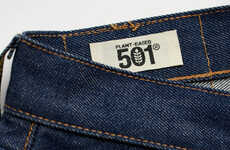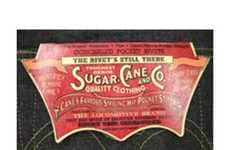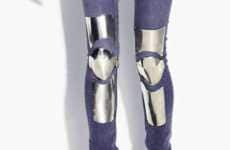
Greg Ponesse — March 28, 2006 — Eco
References: kitmeout
A Japanese company is making jeans out of a blend of sugar cane and selvage denim. The cane used is Sweet Sorghum, otherwise known as Sweet Millet. It's a type of grass grown all over the world for making a molasses-like syrup and animal feed. The Sugarcane jeans that feature this fiber have a faint sweet smell and may have occasional woody tufts poking out of the fabric!
Sugar Cane Jeans are a uniquely Japanese denim made from — you guessed it: sugar cane. For many years Sugar Cane Jeans were a ferociously guarded Japanese secret but today the brand is attracting global attention. Interestingly, Sugar Cane prefer to use the vintage term “dungarees” in preference to the term “jeans” to discribe their product: “The word, ”jeans”, has become the vernacular for faux denim fashion wear that masquerades as the tough, classic waist overalls history made famous.”.
Sugar Cane Jeans are cut from original and truly outstanding Japanese selvage denim. Japanese selvage denim is arguably the finest in the world. Japanese selvage denim is made on old style shuttle looms rather than modern projectile looms. In simple terms this means that the cross thread goes back and forth during the weaving process. Modern looms, shoot each cross thread through individually, hence the edge of the cloth is frayed rather than clean. No shuttle looms have be made for over 40 years as they can only make cloth about 30 inches wide whereas projectile looms can make fabric 60 inches or even wider for much less money.
Sugar Cane Jeans are a uniquely Japanese denim made from — you guessed it: sugar cane. For many years Sugar Cane Jeans were a ferociously guarded Japanese secret but today the brand is attracting global attention. Interestingly, Sugar Cane prefer to use the vintage term “dungarees” in preference to the term “jeans” to discribe their product: “The word, ”jeans”, has become the vernacular for faux denim fashion wear that masquerades as the tough, classic waist overalls history made famous.”.
Sugar Cane Jeans are cut from original and truly outstanding Japanese selvage denim. Japanese selvage denim is arguably the finest in the world. Japanese selvage denim is made on old style shuttle looms rather than modern projectile looms. In simple terms this means that the cross thread goes back and forth during the weaving process. Modern looms, shoot each cross thread through individually, hence the edge of the cloth is frayed rather than clean. No shuttle looms have be made for over 40 years as they can only make cloth about 30 inches wide whereas projectile looms can make fabric 60 inches or even wider for much less money.
Trend Themes
1. Sugarcane-based Fabrics - The trend of using sugarcane fibers in fabric production presents an opportunity for sustainable and eco-friendly clothing alternatives.
2. Japanese Selvage Denim - The trend of using Japanese selvage denim, known for its high quality and craftsmanship, opens up opportunities to create premium and durable denim products.
3. Vintage-inspired Denim - The trend of vintage-inspired denim provides opportunities to tap into nostalgia and create unique and authentic denim pieces.
Industry Implications
1. Fashion - The fashion industry can explore the use of sugarcane-based fabrics and Japanese selvage denim to innovate in sustainable and high-quality denim manufacturing.
2. Textile Manufacturing - The textile manufacturing industry has the potential to develop new production techniques and technologies to incorporate sugarcane fibers into various textile products.
3. Retail - The retail industry can capitalize on the trend of vintage-inspired denim by curating and selling authentic and unique denim pieces that cater to consumer demand.
6.7
Score
Popularity
Activity
Freshness























